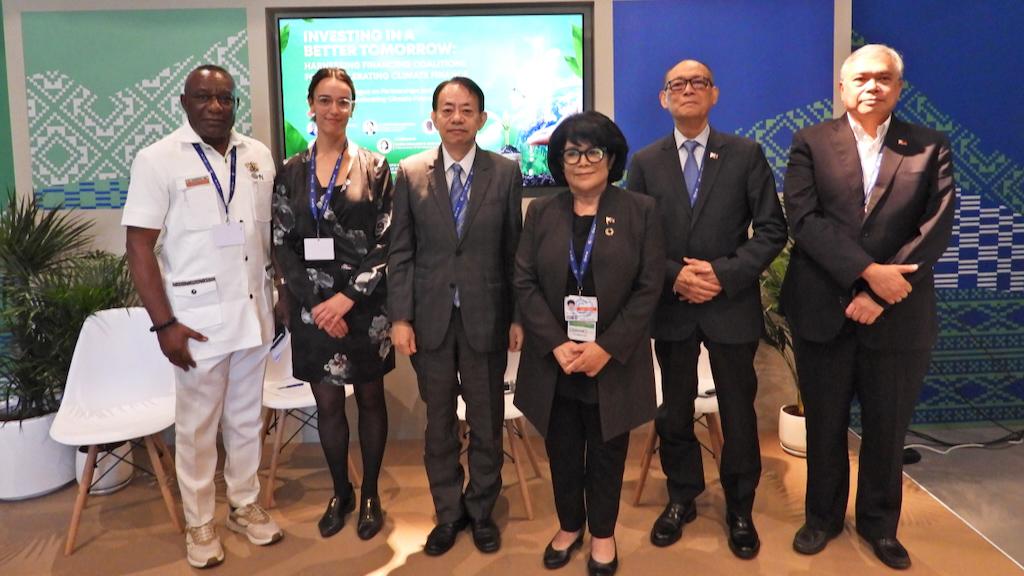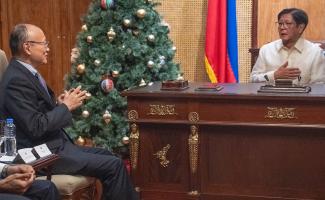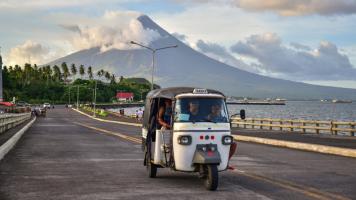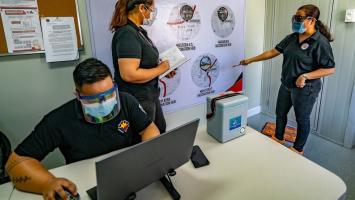
From left: Ghanian Environmental Protection Agency Henry Kwabena Kokofu, Coalition of Finance Ministers for Climate Action Netherlands Deputy Sherpa Michalli Harmsen, ADB President Masatsugu Asakawa, Philippine Environment Secretary Maria Antonia Yulo-Loyzaga, Philippine Finance Secretary and ADB Governor Benjamin Diokno, and Philippine Ambassador to the United Arab Emirates Ferdinand Ver during the high-level dialogue organized by ADB at COP28.
The support will help the Philippines implement its commitments to climate action under the Paris Agreement.
The Asian Development Bank (ADB) will program $10 billion in climate finance for the Philippines between 2024 and 2029. The support, announced by ADB President Masatsugu Asakawa at a high-level dialogue on financing coalitions at COP28 in Dubai, will help the Philippines implement its commitments to climate action under the Paris Agreement.
“The battle against climate change will be won or lost in Asia and the Pacific and nowhere is this more evident than in the Philippines,” said Mr. Asakawa at the event Investing in a Better Tomorrow: Harnessing Financing Coalitions for Accelerating Climate Finance. “I am pleased to announce that ADB will program $10 billion in climate finance for the Philippines under the new country program we are developing with the government. ADB will also continue efforts to mobilize additional climate finance from the private sector, cofinancing partners, and other sources.”
The high-level dialogue was organized by ADB and attended by Philippine Finance Secretary and ADB Governor Benjamin Diokno, Philippine Environment Secretary and head of the COP28 delegation Maria Antonia Yulo-Loyzaga, and ministers from other countries.
The Philippines is among the countries most vulnerable to the impacts of climate change. The Global Climate Risk Index ranked the Philippines fourth in terms of countries most affected by extreme weather globally from 2000 to 2019. Poorer households are disproportionately affected, especially in urban areas with less infrastructure, and along the country’s vast coastal areas. ADB’s climate finance in the Philippines will help improve the climate resilience of communities, ecosystems, and the economy.
ADB is currently preparing its country partnership strategy for the Philippines, 2024–2029, which will prioritize climate action and promote inclusive growth. Under the new strategy, ADB will support low-carbon transport, renewable energy, the development of carbon markets, flood management, resilient coastal development, food security, and adaptive health and social protection.
ADB has been a longstanding partner of the Philippines on climate change. ADB's first dedicated climate policy-based loan under its Climate Change Action Program, Subprogram 1, drove key reforms aligned with the government's nationally determined contribution, which is its commitment to help advance global efforts to stabilize the world’s climate. Additionally, ADB has been instrumental in supporting flagship climate investments through its Infrastructure Preparation and Innovation Facility since 2017.
Two significant projects approved this year, the Davao Public Transport Modernization Project and the Integrated Flood Resilience and Adaptation Project–Phase 1, highlight ADB's commitment to sustainable solutions for climate change mitigation and adaptation in the Philippines.
ADB is committed to achieving a prosperous, inclusive, resilient, and sustainable Asia and the Pacific, while sustaining its efforts to eradicate extreme poverty. Established in 1966, it is owned by 68 members—49 from the region.
This article was first published by ADB on 4 December 2023.


